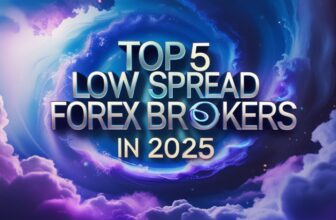
An individual would be in a much better position when exploring Forex trading with a reliable broker providing low spreads and no commission charges. This means having low spreads; the gap between the selling and the buying price is minimal so that traders maximize their benefits. Most of the trading firms promote zero commission accounts; however, one has to understand the spreads clearly so that he can measure all his trading costs.
In my experience, choosing a Forex broker with low spreads and no commissions can lead to better trading outcomes. These brokers often provide more competitive pricing, making it easier to enter and exit positions without excessive costs. Traders should pay attention to the nature of the spreads offered, as different account types may provide varying levels of costs associated with trading.
As you consider entering the world of Forex, understanding the benefits of low spread no commission brokers is key. They not only simplify your trading experience but also reduce the overall costs involved. This knowledge can help you make informed choices when selecting a broker that best suits your trading strategy.
| Features | FP Markets | IC Markets | Pepperstone |
|---|---|---|---|
| Lowest Spread (Raw Account) | 0.0 pips | 0.0 pips | 0.0 pips |
| Standard Account Spread | 1.0 pip | 1.0 pip | 1.0 pip |
| Commission on Raw Account | Yes | $3.50 per lot | $3.50 per lot |
| Regulation | ASIC, CySEC | Multiple Global | Global Regulation |
| Trading Hours | 24/7 | 24/7 | 24/7 |
| Best For | Day Traders, Scalpers | Scalping, High-Frequency | Fast Execution, Scalping |
| Competitive Advantages | Low Cost, Fast Execution | High Liquidity, Advanced Tech | Transparency, Speed |
| Available Assets | Forex, Indices, Commodities, Crypto | Forex, Commodities, Indices, Crypto | Forex, Stocks, Indices, Commodities, Crypto |
Understanding Forex Brokers

Forex brokers play a critical role in the foreign exchange market. They connect traders with the interbank market and provide the platforms needed for trading. Understanding how brokers function, their regulation, and their relationship with liquidity providers is essential for making informed trading decisions.
Role of Brokers in Forex Trading
Forex brokers act as intermediaries between traders and the interbank market. They facilitate the buying and selling of currency pairs for individual traders and institutional clients. There are different types of brokers, including market makers and ECN (Electronic Communication Network) brokers.
Market makers set the bid and ask prices and profit from the spread, while ECN brokers provide direct access to the interbank market. This access often results in more competitive spreads. Knowing the broker type helps me understand potential costs and pricing efficiency in my trades.
Regulation and Safety
Regulated brokers operate under the oversight of financial authorities, which helps ensure fair trading practices. Financial regulators, like the Financial Conduct Authority (FCA) in the UK and the Australian Securities and Investments Commission (ASIC), set strict standards for brokers.
Choosing a regulated broker means my funds are often protected and the broker must adhere to specific rules. Tier-1 regulators offer the highest level of trust and security, reducing the risk of insolvency or fraudulent activity.
Liquidity Providers and the Interbank Market
Liquidity providers supply the market with the necessary funds, ensuring that there are enough buyers and sellers for each trade. These are usually major banks and financial institutions that create a fluid trading environment.
When I trade, my broker obtains pricing from liquidity providers, allowing for timely and efficient trades. This connection to the interbank market is crucial for competitive pricing and lower spreads. Understanding this relationship helps me appreciate the importance of broker selection and trading costs.
3 Low Spread No Commission Forex Brokers: Finding the Best Options for Traders
When trading in the dynamic financial markets, reducing the cost of trading is crucial for maximizing profits. One of the key considerations for traders is choosing brokers that offer the lowest spread with no commissions. The forex spread represents the difference between the two prices at which you can buy or sell the base currency in a forex pair.
In 2025, the competition among brokers offering tight spreads has intensified. This guide highlights three of the best forex brokers that provide low spread, no commission trading options. These brokers are suitable for traders looking for standard accounts, raw accounts, and those focused on high-frequency trading in fx markets.
1. FP Markets
FP Markets is widely recognized as one of the best forex brokers for offering tight spreads and reliable execution. FP Markets is regulated by ASIC (Australia) and CySEC (Europe), ensuring safety and transparency.
| Feature | Standard Account | Raw Account |
|---|---|---|
| Commission | No Commission | With Commission |
| Lowest Spread | Minimum spread of 1.0 pip | As low as 0.0 pips on major pairs |
| Trading Hours | 24 hours a day, covering all major forex pairs | |
| Available Assets | Forex, indices, commodities, and cryptocurrencies | |
| Best For | Beginner traders, those who prefer simpler fee structure | Professional traders, high-frequency traders, scalpers |
Why Choose FP Markets:
- Low Cost of Trading: Competitive spreads make it one of the best zero spread forex brokers.
- Execution Speed: Fast execution minimizes slippage.
- Regulation: FP Markets is regulated, providing peace of mind.
Spreads are typically tight on major pairs like EUR/USD, making FP Markets ideal for day traders and scalpers.
2. IC Markets
IC Markets is a favorite among traders looking for ultra-tight spreads and a no-commission option. It’s known for its ECN-like environment, making it one of the best forex brokers for low-cost trading.
| Feature | Standard Account | Raw Account |
|---|---|---|
| Commission | No Commission | $3.50 per lot |
| Lowest Spread | Minimum spread of 1.0 pip | 0.0 pips on major pairs |
| Trading Hours | 24 hours a day, capitalizing on global financial markets | |
| Available Assets | Broad range of forex pairs, commodities, indices, and cryptocurrencies | |
Why Choose IC Markets:
- Best Zero Spread Forex Brokers: Consistently low spreads on major pairs.
- Liquidity: High liquidity ensures smooth trading even during volatile market conditions.
- Technology: Advanced infrastructure for fast order execution.
IC Markets’ competitive pricing model makes it ideal for scalping and high-frequency trading.
3. Pepperstone
Pepperstone is another top contender in the low-spread, no-commission space. Known for its transparency and speed, it’s one of the leading forex brokers in 2025.
| Feature | Standard Account | Raw Account |
|---|---|---|
| Commission | No Commission | $3.50 per lot |
| Lowest Spread | Minimum spread of 1.0 pip | 0.0 pips on major pairs |
| Trading Hours | 24 hours a day, covering major and minor forex pairs | |
| Available Assets | Forex, stocks, indices, commodities, and cryptocurrencies | |
Why Choose Pepperstone:
- Low Forex Spread: Tight spreads on both Standard Accounts and Raw Accounts.
- Fast Execution: Ideal for scalping and algorithmic trading.
- Reputation: One of the most trusted and best forex brokers with global regulation.
Pepperstone’s no-commission accounts are perfect for traders who want to minimize the cost of trading while accessing tight spreads.
The Importance of Low Spreads

Low spreads are crucial for anyone trading in the forex market. They directly affect trading costs, which can impact overall profitability. Understanding what spreads are and how they influence your trading experience will help you make informed decisions.
Defining Spread in Forex Trading
In forex trading, the spread is the difference between the bid and ask prices of a currency pair. For example, if the EUR/USD pair has a bid price of 1.1000 and an ask price of 1.1002, the spread is 2 pips. Low spreads are often seen with market makers and ECN brokers, making trading more efficient and cost-effective.
Competitive spreads can vary from broker to broker, with some offering spreads as low as 0.0 pips under certain conditions. This is particularly important for traders who frequently buy and sell, as even small differences can add up. A tighter spread means you can enter and exit trades with less impact on your profits.
Impact of Low Spreads on Trading Costs
Low spreads significantly reduce trading costs. When spreads are narrow, it decreases the cost incurred each time a trade is made. For example, with an average spread of 1.0 pip on a currency pair like AUD/USD, a trader pays less to execute trades compared to another broker with an average spread of 3.0 pips.
In the forex market, lower trading costs mean that a trader can keep more of their profits. This is critical, especially for strategies like scalping, which rely on making numerous trades with small profits each time. By lowering costs, traders can improve their win-to-loss ratio, enhancing their overall trading performance.
No Commission and Zero Spread Accounts

Zero spread accounts have become popular among traders looking to minimize costs. These accounts often offer low trading expenses by eliminating commissions and keeping spreads as low as 0.0 pips. Understanding the different types of accounts and how they compare can help traders make informed choices.
Different Account Types
In the world of forex trading, brokers usually offer various account types. A zero spread account allows traders to execute trades without a bid-ask spread, which reduces the cost for scalpers and high-frequency traders. These accounts typically require a minimum deposit and might include some restrictions on trading strategies.
Commission accounts, on the other hand, charge a fee per trade. While they might have tighter spreads, the overall cost can be higher depending on trading volume. Many traders prefer low spread forex brokers as they provide competitive conditions even if they charge commissions.
I always recommend comparing different account options to determine which one aligns best with your trading style and goals.
Comparing Commission and Zero Spread Models
When comparing commission and zero spread trading accounts, it’s essential to look at how they affect overall trading costs. With zero spread brokers, you might avoid commissions, but spreads can vary based on market conditions.
In contrast, commission accounts may advertise low spreads but ultimately incur fees on each trade. I find that traders who frequently open and close positions benefit more from zero spread accounts, saving on cumulative trading costs.
Example: If a trader executes 100 trades in a month, avoiding per-trade commissions can lead to substantial savings with zero-spread accounts, despite potentially wider spreads. Understanding this dynamic helps in planning effective trading strategies while managing costs.
Analyzing Trading Platforms

When selecting a forex broker, the trading platform plays a crucial role in your trading success. I will explore key trading platforms and integrated tools that enhance the trading experience, focusing on their features and usability.
MetaTrader vs. cTrader vs. Proprietary Platforms
MetaTrader 4 (MT4) and MetaTrader 5 (MT5) are among the most popular platforms in forex trading. They offer robust analytical tools, automated trading capabilities, and customizable charts. MT4 is favored for its simplicity and extensive indicators, while MT5 includes advanced features like additional timeframes and a more extensive range of markets.
cTrader is known for its user-friendly interface and fast order execution, making it ideal for scalpers and day traders. Its unique features include advanced charting tools and depth of market information.
Proprietary platforms, offered by some brokers, may provide tailor-made tools and resources. However, they can vary significantly in quality. I suggest testing each platform through demo accounts to see which one aligns best with your trading style.
Integrated Trading Tools and Resources
Integrated trading tools can enhance your experience significantly. Many platforms offer features like economic calendars, news feeds, and educational resources. These tools help traders stay updated on market conditions and trends.
For example, platforms like MT4 and MT5 allow access to Expert Advisors, which automate trading strategies. This can be beneficial for traders looking to execute trades without constant monitoring. Similarly, cTrader includes smart trading tools that support algorithmic trading, which can optimize performance.
Additionally, some brokers offer their own analytical tools that assess market conditions. Features like performance analytics, risk management tools, and trade simulators can help refine trading strategies. Look for brokers that provide these integrated tools to maximize your trading efficiency.
Factors Influencing Trading Experience

Several key elements affect the trading experience with a low spread no commission forex broker. Execution speed and the quality of customer support are two crucial factors. These components can significantly impact how successfully I can navigate the forex market and manage my trades.
Execution Speed and Slippage
Execution speed is vital in forex trading. A fast execution means my trades are completed quickly, minimizing the chances of price changes before my order is placed. This is especially important during volatile market conditions where prices can shift rapidly.
Slippage can occur when my order executes at a different price than expected. This usually happens in highly volatile markets or during major news releases. A low spread broker with quick executions can help reduce slippage, allowing for better trading outcomes. Many brokers offer features like ECN accounts that further improve execution speed and reduce slippage.
Customer Support and Service
High-quality customer support is essential for a smooth trading experience. When trading forex, I may encounter technical issues or need help with account settings.
Reliable support ensures that my concerns are addressed promptly. I look for brokers that offer multiple contact options, such as live chat, phone support, and email assistance. Additionally, good customer service should be available 24/7, as the forex market operates around the clock. I also find it helpful to have access to educational resources and a demo account to practice strategies without financial risk.
Additional Trading Costs and Fees
When trading with a low spread no commission forex broker, it is important to consider all potential costs. These costs can significantly impact overall profitability. I will explore key non-trading fees and emphasize the need for transparency in pricing.
Understanding Non-Trading Fees
Non-trading fees can take various forms and influence how much I end up paying to a broker. Some common types include:
- Inactivity Fees: Many brokers charge a fee if I do not execute trades over a specific period. This fee encourages active trading.
- Withdrawal Fees: I should be aware that some brokers impose charges when I withdraw funds. These fees may vary by withdrawal method.
- Swap Fees: If I hold a position overnight, I might incur swap fees, which are charges for rolling over my position. These can add up, especially in forex trading.
Understanding these non-trading fees helps me make informed decisions. It’s crucial to read the broker’s terms and conditions to avoid unexpected costs.
Importance of Transparency in Pricing
Transparency in pricing is essential when selecting a forex broker. A trustworthy broker should clearly state all potential costs associated with trading and maintaining an account. This includes:
- Trading Fees: Although aiming for a low spread with zero commission, I must still be educated on any hidden trading expenses.
- Comprehensive Fee Structure: Understanding the complete fee structure allows me to calculate the total cost of a trade, which can affect my chosen trading strategy.
If a broker does not openly provide this information, I may need to look elsewhere. Armed with clarity on all fees, I can better manage my budget and improve my trading outcomes.
Choosing the Best Low Spread Forex Broker
When selecting a low spread forex broker, I consider several key factors. These include the types of spreads available, the reputation of the broker, and their overall trading conditions. Understanding these elements can help me make the best choice for my trading needs.
Criteria for Selection
I focus on a few main criteria when choosing a low spread forex broker. First, I look at the type of spreads offered. Brokers like IC Markets and Pepperstone provide competitive options, often with spreads as low as 0.0 pips on certain accounts.
Next, I assess commission fees. Some brokers offer low spreads but charge a per-trade commission, which can impact the overall cost. A zero spread broker, for example, may charge higher commissions, so I need to check that carefully.
Another important factor is the minimum deposit required to open an account. I prefer brokers like FP Markets or AvaTrade, which typically have low minimum deposits. Additionally, I always check for regulatory compliance, ensuring the broker is regulated by authorities like the Australian Securities and Investments Commission (ASIC) or the Financial Conduct Authority (FCA).
















